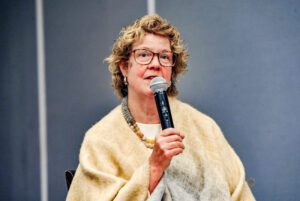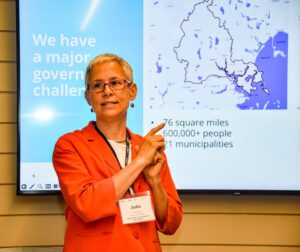Who is a member?
Our members are the local governments of Massachusetts and their elected and appointed leadership.

Melissa Hoffer, the state’s climate chief, speaks during the 2023 Resilient Cities Summit in Falmouth earlier this month.
The 2023 Resilient Cities Summit, held June 6 through 8 in Falmouth, brought together municipal officials, advocates and nationally recognized experts in urban development, design, finance and infrastructure to discuss how cities and towns can better prepare for climate risks and work toward a more resilient future.
Co-hosted by the National League of Cities, the Urban Land Institute, ULI Boston/New England, and the MMA, the event explored decision making regarding climate adaptation while fostering dialogue and learning across municipal and departmental boundaries. The summit aimed to provide access to people, tools and resources that would be helpful to advance resilience in their communities. Workshops offered information, motivation and resources to pursue equitable, resilient projects and processes.
Hadley-based consultant Susanne Moser addressed building “just resilience” by offering practical steps to approach resilience work within and among communities. She addressed common challenges encountered in the field, including reaching a common understanding of resilience, envisioning the transformation to a resilient community, and developing indicators and metrics to track progress.

Julie Wormser, a senior policy adviser at the Mystic River Collaborative, talks about collaborative regional policy development during a June 7 session at the 2023 Resilient Cities Summit in Falmouth.
Sanjay Seth, chief of staff at the U.S. Environmental Protection Agency Region 1, led an interactive discussion to explore why officials engage in climate resilience work, what concerns they had, and what fuels hope.
“Being a climate resilience practitioner is not only about the tension between hope, concern and despair,” he said, “but supporting each other in navigating that.”
Workshops touched on the following topics:
• Techniques and importance of collaboration
• Leveraging land use policy for resilient outcomes
• Public engagement
• Equity and justice
• Financing options and opportunities
• Use of data to support planning and action
Workshop presenters included Massachusetts Climate Chief Melissa Hoffer; Allison Rogers, director for environmental justice public engagement at the White House Council on Environmental Quality; Julie Wormser, a senior policy adviser at the Mystic River Collaborative; and Aubrey Germ, a climate resilience planner for the city of Baltimore.
Attendees were encouraged to observe local projects through self-guided tours of the Waquoit Bay National Estuarine Research Reserve in Falmouth and the Langone Park and Puopolo Playground in Boston’s North End.